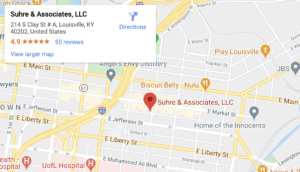
Kentucky DUI Law – KRS 189A.010(1), prohibits driving under the influence of alcohol or any other substance or combination of substances (DUI) or with a certain concentration of alcohol. To sustain a conviction under KRS 189A.1010, Louisville prosecution must prove that the driver was under the influence of the offending substances.
Typically, when convicted of a DUI in Louisville and it’s a first offense, the judge will impose the standard punishment of a license suspension, service fee, fine and substance abuse evaluation.
The Ominbus Act of 2000 has created 6 “aggravating circumstances” which mandate minimum mandatory periods of incarceration.
If a person is convicted of a violation of KRS 189A.101(1)(A) to KRS 189A.1010(1)(D), while operating a motor vehicle then the aggravating circumstances will now apply to the sentencing process. The aggravating circumstances include:
- Driving more than 30 miles an hour over the speed limit;
- Driving the wrong way on a limited access road;
- Causing an accident that results in the death or serious injury of someone while driving and;
- Operating a motor vehicle with the alcohol concentration in the operator’s breath or blood is .18 or more as measured by a test or sample of the operator’s blood.
- Refusing to take blood or breath tests.
- Transporting passengers under 12 years of age
Aggravating circumstances causes the minimum jail time to be doubled and the minimum service time is mandatory.
- First Offense: Imprisonment of a minimum of 48 hours, a maximum of 30 days or fine of $250.00 to $500.00 or both. Following sentencing, first offender may apply for permission to enter a community labor program for not less than 48 hours nor more than 30 days in lieu of a fine or imprisonment or both.
- First Offense Aggravating Circumstances: Mandatory minimum sentence of four days. Fines of $200.00 to $500.00 must also be imposed. Community labor not to exceed 30days may be imposed in lieu of a fine or imprisonment or both.
- Second Offense: Imprisonment of not less than seven days nor more than six months and a fine of $350 – 500.
- Second Offense with Aggravating Circumstances: Mandatory Minimum sentence of 14 days to 6 months and a fine of $350.00 to $500.00 An offender can be sentenced to community labor for 10 days to 6 months.
- Third Offense: Imprisonment of 30 days to 12 months and a fine of not less than $500.00 nor more than $1,000.00.
- Third Offense with Aggravating Circumstances: Mandatory minimum sentence of 60 days and not more than 12 months, a fine of $500 – $1,000.
- Fourth Offense: Class D Felony, with a sentence of one-year minimum, five years maximum. The fine ranges from $1,000 to $10,000.
Kentucky OVI
Pre-Trial License Suspension – The Court must, at the time of arraignment or as soon thereafter, suspend the motor vehicle operator’s license and driving privileges of any person charged with a violation of KRS 189A.010 who; (1) refused to take a chemical test or (2) has a prior DUI conviction or has had his/her operator’s license revoked or suspended for refusal within the last five years or (3) was involved in a motor vehicle accident that has resulted in serious physical injury or death.
After someone has their license suspended under KRS 189A.200, he or she has the right to file a motion for judicial review of the suspension; the Court must conduct that review within 30 days of the motion being filed.
When the Court orders such a suspension, the Defendant must immediately surrender his or her license to the clerk of court. The Defendant will be remanded to the Sheriff by the Court until the license is given to the Court.
Licenses suspended under KRS 189A.200 shall remain suspended until the Defendant is convicted or acquitted or until the court enters an order terminating the suspension.
KRS 189A.010(1) requires that prosecutions require sample collections within two hours of cessation of operation or physical control of a motor vehicle. KRS 189A.010(2) goes on to say that breath and blood samples taken after this two-hour period are not admissible as evidence in prosecutions involving (1)(a) and (1)(e). Samples taken outside of the two hour window may be admissible in prosecutions under KRS 189A.010(1)(b) and KRS 189A.010(1)(d).
Breath Test
KRS 189A.103(3)(b) requires that all breath tests be administered by a peace officer holding a certificate as an operator of a breath analysis instrument issued by the Secretary of the Justice Cabinet.
Breath testing machines must be installed, tested, and maintained by Louisville at a police station or detention facility. Breath analysis performed on any of the approved evidential testing devices must comply with certain requirements (1) 20-minute observation of the suspect immediately prior to testing (2) the machine must be properly calibrated (3) performance of the test in accordance with the manufacturer’s instructions for the use of the equipment.
Blood Test
KRS 189A103.(6) states that only a registered nurse, medical technician or physician is allowed to take blood. No alcohol or organic substance is to be used to clean the skin where a blood sample is to be taken. The blood sample is to be delivered to the Kentucky State Police Laboratory.
Urine Test
Urine samples must be obtained in the presence of the police officer or he can direct someone else to collect the sample. The person witnessing the sample being given must be the same sex as the offender. A clean, dry, securely sealed container must be used for each sample. No preservatives may be used.
Visit our Law Office in Louisville, Kentucky
Suhre & Associates DUI and Criminal Defense Lawyers
214 S Clay St A
Louisville, KY 40202
(502) 371-7000



